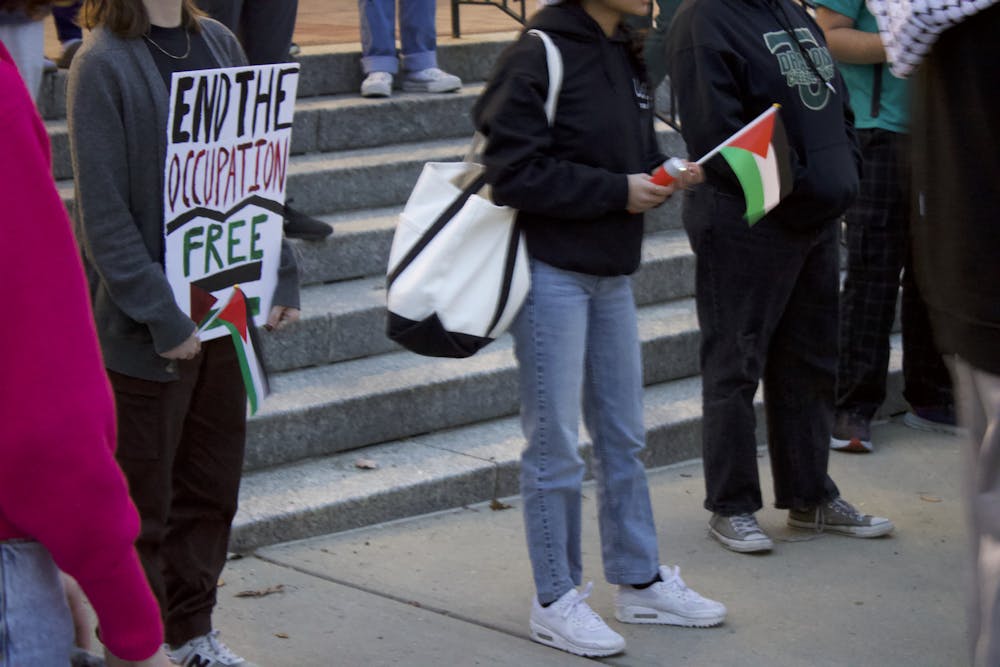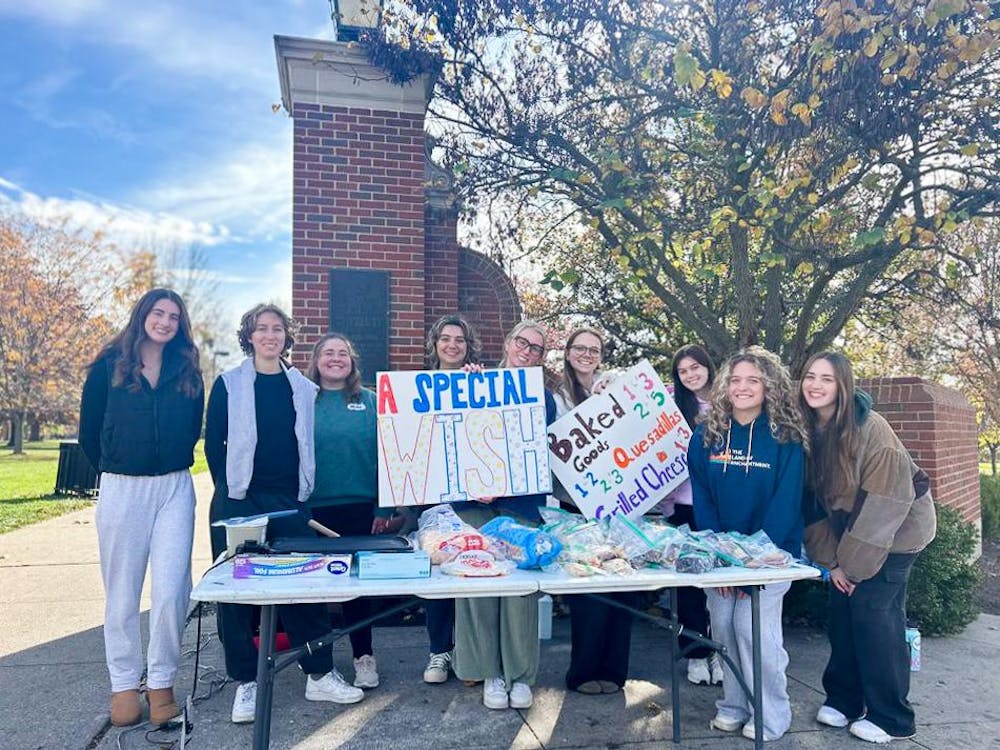As the sun set Thursday night, Miami University students and Oxford residents gathered outside Armstrong Student Center waving Palestinian flags. Members of the crowd held signs of support, handed out flyers with information on the attacks in Gaza and the Israel-controlled West Bank and provided information on how to call members of Congress.
The crowd of about 30 individuals yelled chants calling for an end to violence towards Palestinians, before marching toward Patterson Street and up High Street. The march, hosted by Miami’s Students for Justice in Palestine (SJP), was open to anyone who wanted to show support, bring awareness and demand a ceasefire on the attacks toward Palestinians.
“There is a lot of ignorance around what is happening,” said an unnamed SJP member. “We want to inform people to help the cause because people genuinely don’t know what is happening.”
According to the Associated Press, as of Thursday, more than 10,000 Palestinians had been killed in Gaza and more than 160 in the West Bank.
More than 1,400 people in Israel have been killed, and about 240 individuals are being held hostage from the militant group, Hamas. The heightened violence comes as a result after Hamas fired a series of missiles and led a ground incursion into southern Israel on Oct. 7. Two days after the attack, Israel declared war on Hamas, and then on Oct. 11, the Israeli government announced a blockade on the Gaza Strip, according to the AP. The Gaza Strip is home to more than 2.3 million people, bordering Israel, Egypt and the Mediterranean sea.
Since then, the Israeli Defense Force has focused its efforts in northern Gaza, where residents are living without electricity and running water and experiencing food and medicine scarcity, according to the AP.
Walking up High Street but staying on the public sidewalk, the group briefly stopped at Miami President Greg Crawford’s house to express frustration at the lack of a response from the university on the attacks.
On Oct. 11, Crawford sent an email to students, faculty and staff, providing resources for those affected by the violence in the Middle East. In a previous interview for The Miami Student, the SJP member said the timing of the email and lack of acknowledgement at the larger context felt one-sided. On Oct. 22, SJP posted a response to the statement, but there has been no other communication from the university.
When the group reached Uptown Park, students stopped to share speeches about personal experiences, the importance of the cause and why a ceasefire is necessary.
“The loss of life over the last month has been staggering, almost too big to hold, but we must act now,” said Maysa Constandinidis, the president of SJP. “The Israeli government is plowing forward toward a fully genocidal attack on Palestinians in Gaza. We must demand a ceasefire now.”
Darek Sanabria, a junior diplomacy major, gave an impromptu speech, inspired by the other members who talked. He said he decided to join the march and talk because he felt compelled by his feelings about the attacks.
Enjoy what you're reading?
Signup for our newsletter
“It was a very easy decision to make, especially with my field of study,” Sanabria said. “It’s very clear to see the power dynamics of what is going on. It’s very clear that one particular side is far more oppressed and marginalized in what’s going on.”
Sanabria was also one of the thousands who marched in Washington D.C. over the weekend, calling for an end to Israel’s bombardment.
After leaving Uptown Park, the group marched down the rest of High Street before cutting across Main Street and down Spring Street. As members of the group marched and chanted, people came out of their homes to watch the group, some in support and others not. The Miami University Police Department monitored the event to make sure the marchers followed the law and everyone was safe.
After returning to Armstrong, the group chanted a few more times before dispersing. Although SJP has done other programming to show support for Palestine, the unnamed SJP member said this event wasn’t just for Miami students.
“This one differs because it was focused around informing the whole community,” they said. “We went around campus and Uptown handing out flyers because we want to encourage people to do their research.”
John Kellis, a first-year finance major, is not a member of SJP but joined in the march to ask questions. He said he supports Israel but joined in the march to learn more.
“I just came out to ask questions,” Kellis said, who asked marchers why they consider the attacks on Palestinians to be a genocide.
Dylan Halpin, a senior individualized studies major, marched to show his support of Palestine and a ceasefire in Gaza and the West Bank.
“There’s a history of human right abuses and lies by the far-right Israeli government,” Halpin said. “... Almost every Palestinian activist I’ve met supports a ceasefire.”
The unnamed SJP member said they were pleased with the turnout and hopes the marchers take away a feeling of success from the event.
“We hope our community feels accomplished, empowered,” they said. “[I hope they] feel like they’re making a change.”




